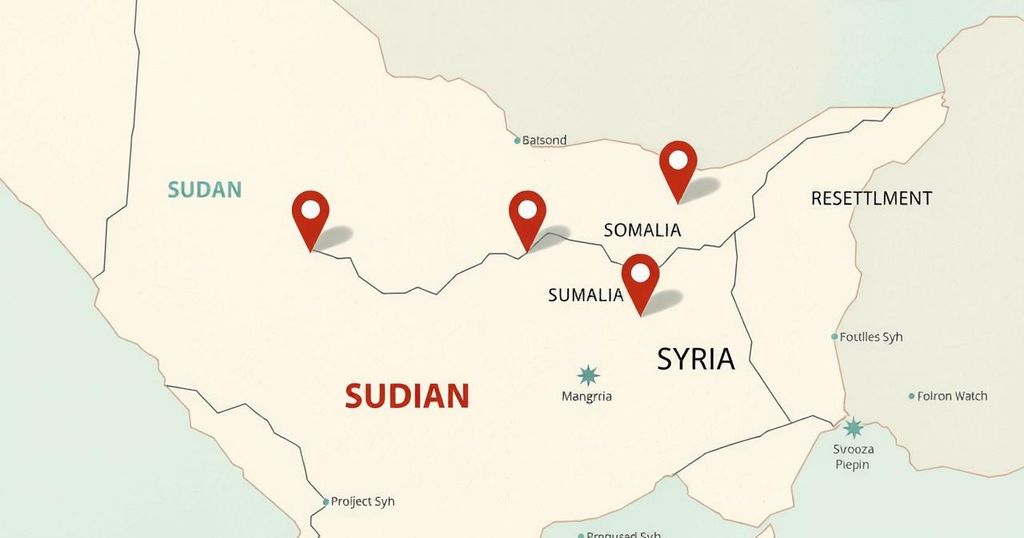U.S. and Israel Explore Resettlement of Gazans to Sudan, Somalia, and Syria

The Trump administration and Israeli officials are reportedly considering Sudan, Somalia, and Syria for the resettlement of Gazans, part of a strategy to conclude hostilities with Hamas and rehabilitate Gaza. While some officials see this as an option, significant skepticism and opposition exist, particularly from the countries involved and humanitarian advocates who warn against the potential for ethnic cleansing and regional instability.
The Trump administration and Israeli officials have reportedly engaged with Sudan and Somalia regarding the potential resettlement of Palestinians from Gaza. Sources indicate that this initiative is part of a broader strategy aimed at concluding Israel’s ongoing conflict with Hamas and rebuilding Gaza. President Trump emphasized that no Palestinians would be forcibly removed, clarifying that the discussions are consideration of options rather than expulsion.
During a press conference on February 4, Trump proclaimed that Gaza could evolve into the “Riviera of the Middle East,” suggesting that humanitarian nations might allow construction of new homes for the 1.8 million displaced Palestinians. This initiative has allegedly gained momentum, as both Israeli and U.S. officials expressed their interest in additional countries, including Syria.
Further insights reveal the Trump administration’s attempts to connect with Syria’s interim government through third-party channels, although responses from Syria remain uncertain. Meanwhile, the Somali ambassador, Dahir Hassan, stated that neither the U.S. nor Israeli officials approached Somalia regarding this matter, warning that spreading unverified claims could exacerbate regional security issues, particularly concerning extremist recruitment.
The historical context highlights that Sudan is currently experiencing a civil war, making the situation there precarious for any resettlement plans. Similarly, Somalia grapples with instability due to ongoing violence from Al-Shabaab. Despite these challenges, Trump indicated that Palestinians might have the option to relocate, albeit implying that their departure could be indefinite.
In light of the humanitarian crisis resulting from the ongoing conflict, recent estimates from the United Nations indicate that an overwhelming majority of housing in Gaza is either damaged or destroyed, with significant casualties reported since the violence reignited following the October 7 attack by Hamas. The proposals from the Trump administration drew strong criticism from multiple Arab states and Democratic lawmakers, branding the notion undertones of ethnic cleansing.
While Arab leaders suggested an alternate Egyptian reconstruction approach for Gaza, both the Trump administration and Israel dismissed it, asserting the region remains uninhabitable. Syria’s new government, having recently replaced the Assad regime, has not engaged publicly with the resettlement proposals. Advocacy groups are urging direct interaction with the new leadership in Syria to ensure stability while opposing Iranian influence.
Israeli actions concerning military airstrikes in Syria further complicate the political landscape, while U.S. officials continue to explore options for improving living conditions for Gazans. As a diplomatic strategy, U.S. Middle East Special Envoy Steve Witkoff acknowledged the need to identify viable resettlement routes for Gaza’s displaced populace, prompting discussions surrounding potential relocation to neighboring Arab states and beyond.
This logistical challenge arises amid a backdrop where numerous Palestinians already exist as refugees in surrounding Arab nations. The calls from far-right Israeli ministers advocating for the expulsion of Palestinians reflect a controversial stance, perceived as an integral aspect of fulfilling historical claims to the land. Responses from officials in both the Israeli government and the White House to CBS News inquiries have been noted as nonexistent, indicating a lack of official clarity on this developing situation.
In summary, U.S. and Israeli interests have sparked discussions regarding the potential relocation of Palestinians from Gaza to countries such as Sudan, Somalia, and Syria, reflecting a broader strategy to address the ongoing conflict and humanitarian crisis. However, substantial opposition from regional leaders and humanitarian groups, alongside ambiguous responses from targeted nations, has clouded the viability of such proposals. The situation continues to evolve as advocates call for a more direct engagement with new Syrian leadership, and the implications of these discussions will require careful consideration amid ongoing tensions.
Original Source: www.cbsnews.com








